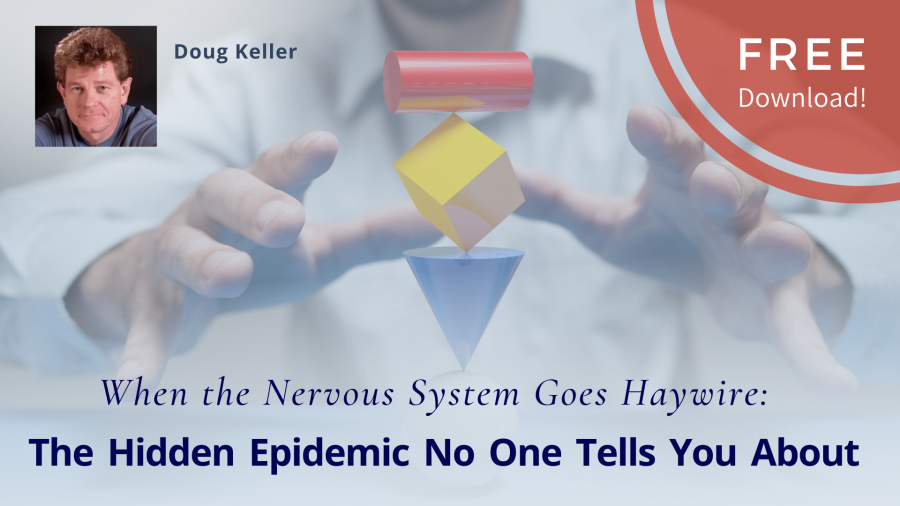Free Download! When the Nervous System Goes Haywire – The Hidden Epidemic No One Tells You About
Course Info
- Price:
- $0.00
Doug Keller
 Doug Keller’s background reflects a lifelong commitment to studying, imbibing and sharing the vast field of knowledge and practice known as yoga. After receiving honors and graduate degrees in philosophy from the top Jesuit universities in the United States, Georgetown and Fordham Universities, and...
Doug Keller’s background reflects a lifelong commitment to studying, imbibing and sharing the vast field of knowledge and practice known as yoga. After receiving honors and graduate degrees in philosophy from the top Jesuit universities in the United States, Georgetown and Fordham Universities, and... 
With the stress of the pandemic now seemingly behind us, most of us are starting to breathe a sigh of relief and return to our normal habits.
However, while you won’t read much about it in the news, a new major concern is emerging: The so-called ‘long-hauler’ syndrome.
As new research emerges on the long-term effects of the novel coronavirus, a disturbing picture emerges: Of those affected, a staggering 12 - 30% develop long-term symptoms, which linger on for months and even years.
These symptoms are so varied that the medical community has been struggling to understand exactly what the Long Hauler syndrome is and what is causing it.
Symptoms include general fatigue, chest pain, heart palpitations, brain fog, headache, sleep problems, dizziness, a feeling of pins and needles in the skin, depression, anxiety, joint or muscle pain, rashes, and digestive symptoms.
Interestingly though, says yoga therapist and author Doug Keller in this free download, these symptoms are not new. It’s just that Long Covid increasingly has brought them to our attention.
“These clusters of symptoms existed before SARS-CoV-2, but they were not foremost in our consciousness,” notes Doug. However, more and more researchers now believe that there could be one underlying cause for the long-hauler syndrome: a condition known as dysautonomia, i.e., a dysfunction in the autonomic nervous system.”
The autonomic nervous system is that aspect of our nervous system that takes care of the automatic functions of the body that we don't have to think about, explains Doug. This includes respiration, heartbeat, blood pressure, regulation of the digestive system, and so on.
It is not just people who have been infected by SARS-CoV-2 who suffer from dysautonomia. The condition is also thought to be related to problems like fibromyalgia, chronic fatigue, various forms of inflammatory conditions and arthritis, Crohn's disease, and much more.
But Long Covid has brought new attention to the issue. There may be something about Covid that attacks the autonomic nervous system and sets off this dysautonomia problem, Doug notes.
Doug then talks about how yoga may offer some relief for people struggling with dysautonomia because of the effect numerous yogic practices have on balancing the nervous system, particularly vagus nerve function.
“In dysautonomia, essentially, the nervous system fails to regulate the sympathetic and parasympathetic balance of the nervous system,” notes Doug. “When we're under stress, like having a cold or fighting a virus or emotional stress, we go into a sympathetic response which is the body's defensive response to these things.
“Once the challenge has been met, the body is supposed to shift back into the parasympathetic, normal functioning, which is controlled by the vagus nerve. With these inflammatory conditions and the persistence of these symptoms, it's largely because we cannot shift back into a parasympathetic state.
“Something is wrong with the system, which can create a vicious cycle of symptoms that either worsen or become chronic. So the real problem is with the nervous system itself not being adaptable enough.”
The vagus nerve plays a principal role in this, Doug notes. The adaptability of the vagus nerve, i.e., its ability to respond and restore us to a parasympathetic state, is going wrong in dysautonomia cases.
Doug then spends the rest of the talk sharing his insights into how simple and accessible yoga practices can help support and restore the ability of the parasympathetic system to rebalance itself.